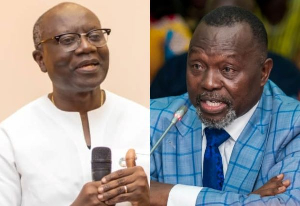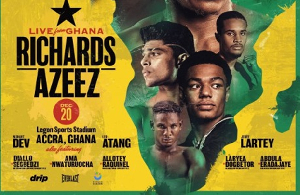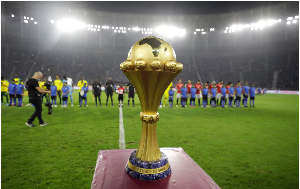A GNA Feature by Boakye-Dankwa Boadi
Accra, April 5, GNA - The Ghana News Agency on Thursday reported the visit of Mr Yu Wenzhe, Ambassador of the People's Republic of China, to familiarize himself with its activities and to renew the Embassy's friendship with the Agency.
He said the Chinese Government would build a number of hospitals in the country to deepen the socio-economic ties between Ghana and China, adding that since independence, there had been close cooperation in all spheres - political, social and economic - and called for the strengthening of the union to their mutual benefit.
Mr Yu said the GNA like its counterpart Xinhua in China had a vital role to play in the gathering and dissemination of relevant information that would enhance the image of their countries.
"The responsibility of the media is very important," he said, and added that technology had made the world a global village, which, therefore, made it imperative for news agencies to be current in order to become the preferred medium of information dissemination. Mr Yu lauded the GNA for its leadership role in newsgathering and dissemination in the country.
During the discussions Mr Yu drew attention to the one-sided reportage of the Western Media during major events on the globe, citing the recent disturbances in Tibet.
He drew attention to a story filed by Xinhua, a strategic partner of GNA.
Xinhua had reported: "While some Western media rashly accuse China of "violent crackdown on the "peaceful protests" in Tibet, some foreigners there disagreed.
"Many reports were not accurate," said Tony Gleason, Field Director of Tibet Poverty Alleviation Fund, an American organisation, which helps poor Tibetans through skill training and small sum financing.
Mr Gleason was reported to have said that while he was surfing the Internet in his hotel he saw Western media reports on the incidents in Tibet. "In some reports the riot was described as "peaceful" and "unarmed" demonstration crackdown by the Chinese Government. "The protests were by no means peaceful." Mr Gleason said. He recalled that he was dining at the Snowland Restaurant (in Lhasa) with his wife and one-year-old daughter on March 14 when a large group of mobsters threw bricks and hand-sized rocks at cars on the street.
"'I saw black smoke from the centre of the city, and there was more smoke from different parts,' he said at the Gajilin Hotel, where he lives and works.
"'I never saw police open fire to the mobsters,' he added. "Ursula Rechbach, from Slovenia, has worked more than eight years for Lhasa-based Project for strengthening the Tibetan Traditional Medicine.
"The Lady in her 50s said she was having lunch with her colleagues on March 14, when the riot started. Her Tibetan colleagues quickly accompanied her to her hotel.
"'We hardly made it,' Ursula said of the terrible day, adding she saw from the roof of the hotel that young people in the late teens holding long sticks and stones in their hands, screaming, turning over cars, setting cars on fire and smashing and looting shops. "She later spoke to a few other foreigners in Tibet. Based on what they had seen, they agreed that the riot must have been organised. 'You can't have it all of a sudden. It can be (happening) in one place, if it is not organised. It must be premeditated, at least prepared,' she said. "Commenting on some Western media accusing China of 'massacring Tibetans' in their 'peaceful protest', Ursula said: 'You can invent some stories in order to sell better, but how can you accuse anybody if you were not there?' She asked.
"Guzman Escardo, who works with the Association for International Solidarity in Asia (ASIA) told Xinhua that the local police had been extremely polite, contrary, to what the Western media presumed. "'The police on the streets are kind and polite. They always smile at me,' he said.
"Escardo said he watched channel nine of China Central Television (CCTV) and the Spanish TV to see what was going on. "'The local government often contact us to make sure I am safe. They take a lot of care of me,' he said. 'I feel safe at the hotel.'
"Aside from foreigners in Tibet, tens of thousands of Chinese citizens have lashed out at a number of Western media for distorting facts in covering the riots in Lhasa.
"According to the citizens, German newspaper, "Berlin Morning Post" posted a picture on its website in which police in Lhasa rescued a young man of Han nationality assaulted by rioters. But the caption said 'insurrectionist taken away by police.'"
When this Writer decided to also surf the Internet for Western media coverage on the event, the following came up: "BEIJING, March 23 (Xinhua) - Tens of thousands of citizens have answered calls to condemn CNN and a few other Western media organizations for distorting facts in covering the riot in Lhasa, capital city of China's Tibet Autonomous Region.
"The fairness and objectivity of CNN is subject to cuts," said one of the postings at the online forum of www.china.com, referring to a CNN website picture showing people running in front of a military truck. The original picture uploaded by Chinese citizens, however, actually also shows mobsters throwing stones to the truck.
"CNN has cut the part of mobsters attacking the military truck? That's misleading the public," said a posting by Sanfeng.
"The citizens say that CNN and some western media organizations have intentionally neglected cruelties of the mobsters, revealing the hypocrisy of "objectivity and fairness" they had flaunted.
"CNN caption of another picture on its website said that some
"Tibetan youth" were attacking a "Chinese".
"Aren't Tibetan youth also Chinese? I doubt whether the Editor has ever studied history," said one of the postings."
"British Broadcasting Corporation (BBC) released a picture on its website showing Chinese Armed Police officers helping medical staff move a wounded person into an ambulance.
"The website's caption said that "there is a heavy military presence in Lhasa", neglecting obvious "First Aid" and "Red Cross" signs on the ambulance.
"German newspaper Berlin Morning post posted a picture on its website in which police in Lhasa rescued a young man of Han nationality assaulted by rioters. But the caption said "insurrectionist taken away by police".
"American Fox TV said in a picture's caption on its website that Chinese military dragged some protestors onto a vehicle but actually the uniformed people were Indian police. "N-TV headquartered in Germany used a TV footage in which Nepalese police captured protestors to report the riot in Tibet. "Citizens on the on-line forum of www.huanqiu.com said that to uglify the Chinese government image, unfounded materials have been frequently used by some overseas media. "One Citizen said a Canadian traveller, who witnessed the riot in Lhasa wrote it in his blog: those rioters assaulted civilians and policemen, which would have been cracked down on more severely if it happened in western countries. "The Canadian traveller also took a picture of Chinese Armed Police building up a human wall using shields to defend stones and bricks thrown by rioters and put it in his blog. "Although the picture has been published by the New York Times on its front page, the caption made no mention of the attack of the rioters." The GNA has been engaged in a relentless war to correct the Western media negative stereotyped reportage of world events, especially when they did not involve their own countries. The case that readily comes to mind is the Western media report that President John Agyekum Kufuor, then African Union (AU) Chairman, failed in his bid to bring peace to Kenya, when in fact they did not know the agenda of the AU Chairman when he enplaned from Accra to Nairobi. How on earth could someone concluded that President Kufuor had failed when the one did not know exactly what he was going to do in Kenya? When Busumuru Kofi Annan, Immediate-Past Secretary General of the UN, eventually, succeeded in brokering peace in Kenya, the Western media said he achieved success working under the auspices of the UN, refusing to accept that it was President Kufuor, who set up the Committee of Eminent African Personalities and made Busumuru Annan the chairman. Fortunately the Kenyans knew better and came to thank President Kufuor for working to restore peace in their country. A recent interview Mr A. Kalpini, Ghanaian Journalist covering the Zimbabwe elections in Harare, granted Peace FM, an Accra private radio station, also betrayed the Western media. The presenter asked Mr Kalpini whether there were armed security personnel on Harare streets as it was being reported by the Western Media? He retorted: "Where?" He said he had just moved from his hotel at the centre of Harare to the office of the Electoral Commission but did not see any armed security men on the streets. One is very much aware of the might of the Western media and appreciates the enormity of the fight against their stereotyped reportage, more so as many readers have so much been brainwashed to always see things from their angle. Many readers take whatever they read from the Western media as the absolute truth and nothing but the truth. To them all other reportage on unfolding events is false as far as they deviated from Western media reports. Let us analyse a typical Western media report below: "Renewed violence has broken out in a Tibetan area of western China, with reports of several injuries. "Xinhua news agency said rioters attacked government offices in Garze, Sichuan province, on Thursday evening, leaving one official seriously hurt.
"Tibetan exile groups say security forces fired on crowds of civilians, killing at least eight people.
"The violence comes weeks after unrest swept through Tibetan areas and Beijing responded with a security crackdown.
"Protests were peaceful initially, but later turned violent and ethnic Chinese were targeted.
"Tibetan exile groups say Chinese security forces killed dozens of protesters. Beijing says about 19 people were killed in rioting.
"Foreign media organisations cannot report freely from Tibetan areas, so it is difficult to confirm facts from the area.
'Warning shots'
"The latest Xinhua report states that a government official was
"attacked and seriously wounded" in the Donggu Township at about 2000 (1200 GMT) on Thursday.
TIBET DIVIDE
China says Tibet was always part of its territory
Tibet enjoyed long periods of autonomy before 20th century
1950: China launched a military assault
Opposition to Chinese rule led to a bloody uprising in 1959
Tibet's spiritual leader the Dalai Lama fled to India
"'Local officials exercised restraint during the riot and repeatedly told the rioters to abide by the law," Xinhua quoted an official with the prefectural government as saying.
"'Police were forced to fire warning shots and put down the violence,' the official added.
"A UK-based activist group said eight people had been killed in the incident - including at least three women and one monk.
"Matt Whitticase of the Free Tibet Campaign said Tibetan exiles in India confirmed that monks had marched on government buildings after two of them were arrested for having pictures of their spiritual leader, the Dalai Lama.
"More than 350 monks demanded their release and were joined by about 400 lay people, he said.
"Security forces opened fire after the demonstration had begun to disperse, he said.
"Chinese authorities have repeatedly blamed the Dalai Lama, who lives in exile in India, for stirring up unrest. The Nobel Peace Prize laureate denies the accusations."
Every good journalist can see clearly the bias in this reportage. The third paragraph should have been the second. It is the natural "neck' of the lead. But the Editor cleverly interjects with what Tibetan exile groups, who were not present at the scene, said, and by so doing giving their claim some authenticity.
Who are the ethnic Chinese being referred to in the story? China is a unified multi-ethnic country and Tibet is an inalienable part of China. In the seventh century Songtsan Gambo, King of Tubo Kingdom, who ruled Tibetan Plateau, married Princess Wen Cheng of Tang Dynasty.
The Tibetans and Hans then formed close economic and cultural relations laying the groundwork for the ultimate foundation of a unified nation. Tibet became part of the territory of China in the 13th century.
Again why should the security forces wait until the demonstrators decided to disperse before firing? Why did they not fire at first? One would entreat readers to always read in-between the lines of Western media reportage. When there is fighting in an African country it is reported as tribal war. When there is fighting in a European country it is "ethnic" cleansing.
The guardian.co.uk reported: "Serbia has formally proposed partitioning Kosovo along 'ethnic' lines". This is because Serbians and Albanians are Europeans so the word 'tribe' does not befit them. 5 April 08
Opinions of Sunday, 6 April 2008
Columnist: GNA














